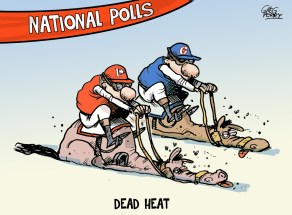Climate change not a partisan issue
Read this article for free:
or
Already have an account? Log in here »
To continue reading, please subscribe:
Monthly Digital Subscription
$0 for the first 4 weeks*
- Enjoy unlimited reading on winnipegfreepress.com
- Read the E-Edition, our digital replica newspaper
- Access News Break, our award-winning app
- Play interactive puzzles
*No charge for 4 weeks then price increases to the regular rate of $19.00 plus GST every four weeks. Offer available to new and qualified returning subscribers only. Cancel any time.
Monthly Digital Subscription
$4.75/week*
- Enjoy unlimited reading on winnipegfreepress.com
- Read the E-Edition, our digital replica newspaper
- Access News Break, our award-winning app
- Play interactive puzzles
*Billed as $19 plus GST every four weeks. Cancel any time.
To continue reading, please subscribe:
Add Free Press access to your Brandon Sun subscription for only an additional
$1 for the first 4 weeks*
*Your next subscription payment will increase by $1.00 and you will be charged $16.99 plus GST for four weeks. After four weeks, your payment will increase to $23.99 plus GST every four weeks.
Read unlimited articles for free today:
or
Already have an account? Log in here »
Hey there, time traveller!
This article was published 22/08/2019 (2300 days ago), so information in it may no longer be current.
Politicians treating reality as if it’s up for debate is no joke — it’s dangerous.
When the humour is obvious, that’s one thing. Among the campaign promises once made by the Rhinoceros Party, the satirical political party that entertained Canadians between 1963 and 1993, was a pledge to repeal the law of gravity.
The Rhino promise was clearly a joke, not to mention an impossibility, but People’s Party of Canada leader Maxime Bernier’s assertion that Canada should pull out of the Paris Accord because there is “no scientific consensus on the theory that CO2 produced by human activity is causing dangerous global warming today or will in the future,” is just as ridiculous and patently unscientific.

However, Elections Canada’s response is no laughing matter.
Noting Mr. Bernier’s skepticism on the issue, the agency responsible for conducting federal elections warned environmental charities that because the PPC leader’s doubts are part of the party’s official platform, any group promoting climate change as real or dire or dangerous — all of which it is — could be considered partisan.
Let’s say that again: coming off the hottest July in recorded history, as chunks of Greenlandic iceberg plummet into the sea, any charitable group asserting that climate change is an actual thing could be considered prejudiced in favour of any party that also accepts as true the conclusions of the world’s scientific community — which is most of the major parties. Facts are not partisan.
For environmental charities, this could mean any advertising campaign costing $500 or more could require them to register with Elections Canada as a partisan group, a process that can threaten their charitable status in the eyes of the Canada Revenue Agency (CRA).
The PPC is still fighting for the right to participate in official election debates in October; under criteria established by the federal government, the party falls short of the required threshold. Should a plank in a fringe party’s platform — a party not considered viable enough for its views to be part of the national debate-stage dialogue — be justification for muzzling environmental groups from presenting the electorate with scientific evidence about a major issue?
Earlier this week, the CRA tried to reassure charity groups by stating ads regarding climate change would not threaten their charitable status, even if Elections Canada required them to register as third-party advertisers. But the president of World Wildlife Federation-Canada was quick to point out that grey areas in the law might still leave organizations at risk if a complaint is registered with Elections Canada.
Noting Mr. Bernier’s skepticism on the issue, the agency responsible for conducting federal elections (Elections Canada) warned environmental charities that because the PPC leader’s doubts are part of the party’s official platform, any group promoting climate change as real or dire or dangerous– all of which it is — could be considered partisan.
Mr. Bernier has since contested the ruling, stating it contravenes another of his party’s platforms: the right to free speech. However, in some ways, the damage has been done. Framing the issue as a matter of opinion, as Mr. Bernier has done, is only reinforced by the Elections Canada ruling, which suggests climate science is a partisan issue during an election campaign.
If only we could have elected a party to repeal the law of gravity, and had Elections Canada silence the troublesome “But There Is Gravity” groups, we might well live in a world whose skies are filled with flying cars. But that’s not the current reality.
Climate change itself is not up for debate; to waste time doing so is fiddling while Rome burns (and Jakarta floods).
If we don’t have informed voters prepared to elect leaders to deal with it, following a free and fair debate on how to efficiently and swiftly address it, our future will be one for which we’re woefully unprepared.










